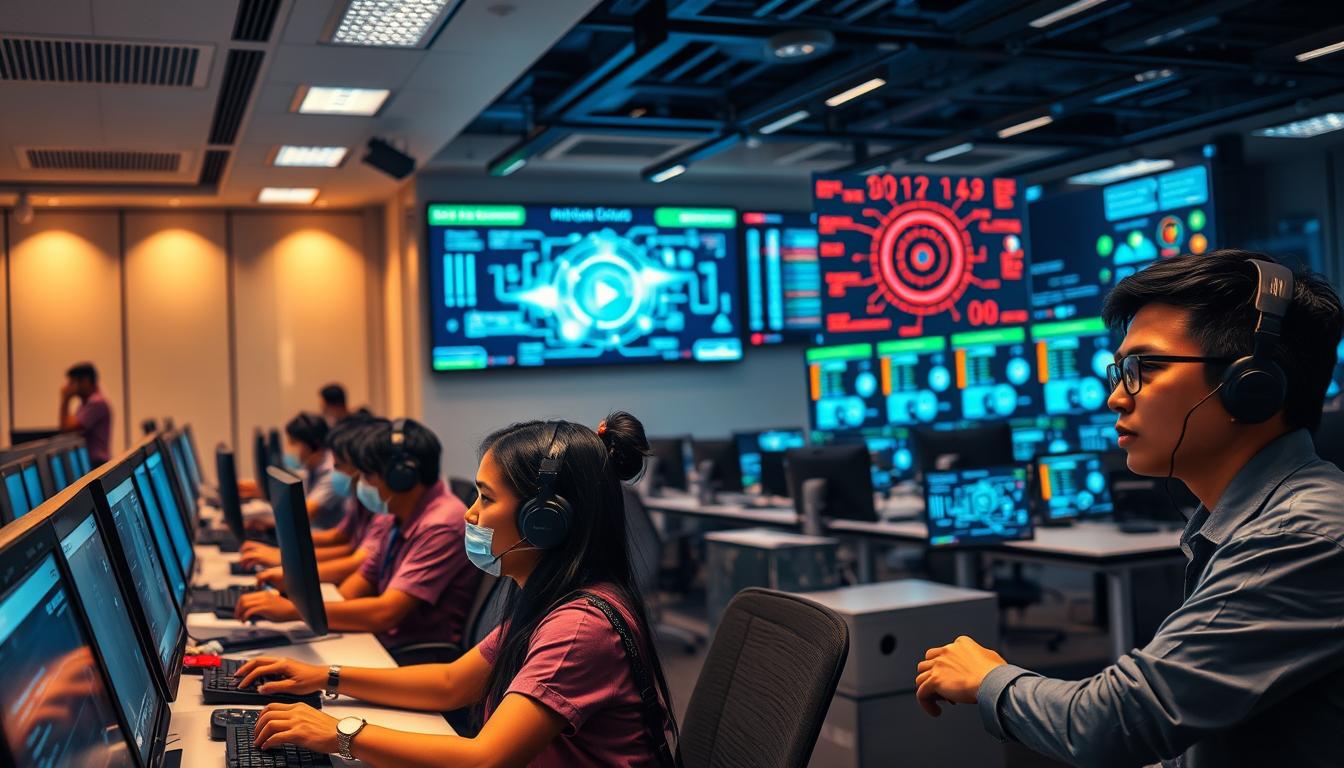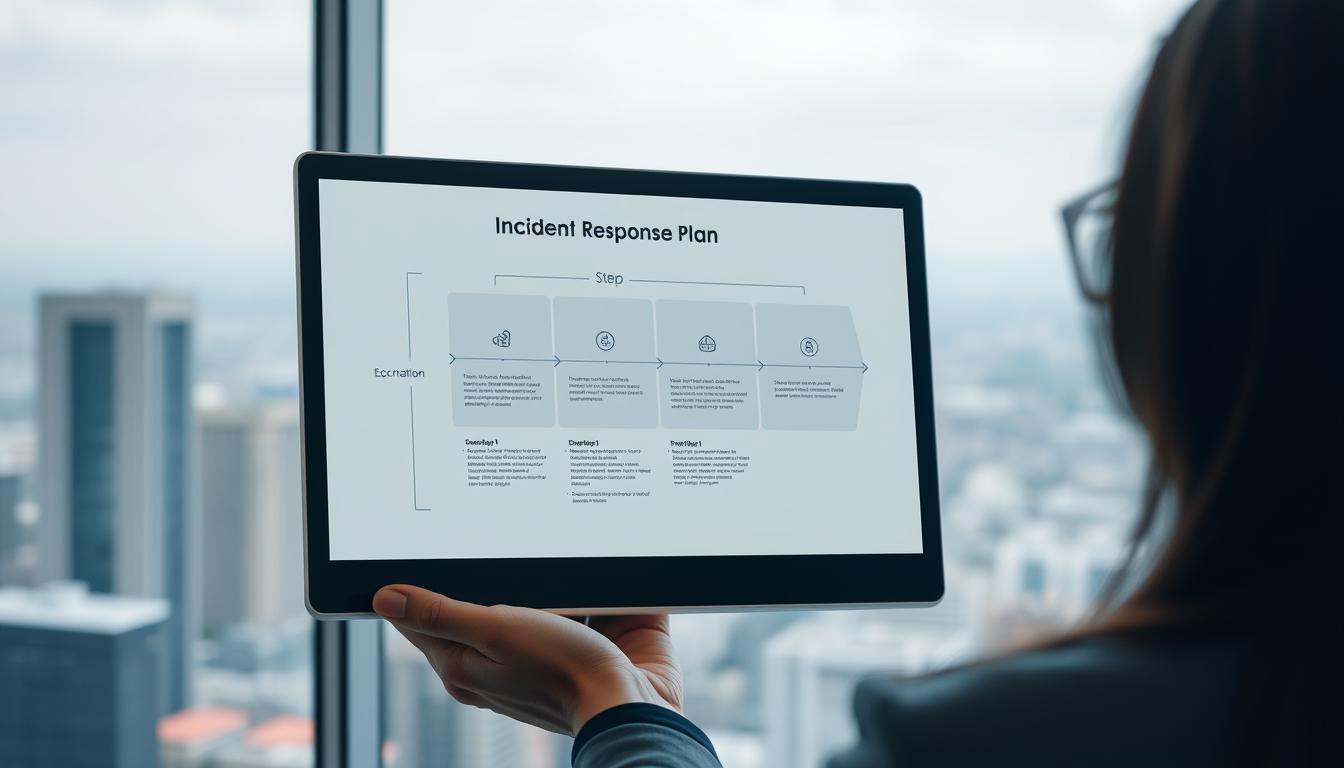Ever thought about how safe your company’s ERP system is? With ERP systems handling many business tasks, keeping them secure is crucial. Today, risks like unauthorized access and old software are big threats. This article will show you how to spot and fix these risks, keeping your ERP system safe, even for small businesses in the Philippines.
Key Takeaways
- Understanding the essential role of ERP security in today’s business landscape.
- Identifying common vulnerabilities that threaten ERP systems.
- Exploring risk mitigation strategies to enhance system security.
- The importance of ongoing assessments to maintain ERP security.
- Recognizing the role of employee training in protecting ERP systems.
Understanding ERP System Security
ERP system security is key for organizations to protect their operations. It’s vital to safeguard sensitive data tied to business processes. This includes finance, supply chain, and human resources. Strong security practices are needed to fight off threats that could harm businesses.
Importance of ERP Security in Organizations
ERP systems are crucial for many organizations, holding vital data for decision-making. The importance of ERP security is huge. If data is compromised, it can cause big problems and financial losses. It’s important for organizations to focus on security to protect data and keep stakeholders’ trust.
Common Security Threats to ERP Systems
ERP systems face many security threats that can harm them. Some common threats are:
- Cyberattacks targeting unauthorized access
- Malware infections that disrupt operations
- Physical security challenges, affecting hardware safety
- Vulnerabilities from weak configurations
Big incidents show how serious these threats are. It’s important for organizations to know and tackle these issues. They should be ready and proactive to protect their ERP systems from breaches.
Assessing ERP System Vulnerabilities
Managing an Enterprise Resource Planning (ERP) system well means finding and fixing vulnerabilities. Companies need to check their systems for weak spots to keep data safe and operations running smoothly. These checks often find issues like wrong settings, old software, or bad login methods.
Identifying Weak Points in Systems
ERP systems have weak spots that can hurt a company’s security. Important areas to look at include:
- Configuration settings
- User access permissions
- Software versioning and updates
- Authentication protocols
Checking these areas regularly helps find problems early. This leads to better choices for improving and securing systems. Knowing where vulnerabilities are helps companies strengthen their defenses against threats.
The Role of Internal and External Threats
Both internal threats ERP and external threats ERP are big risks for ERP security. Internal threats come from employees who might not follow rules or might even try to harm the system. External threats, like hackers and unauthorized access, need strong security measures. Companies should protect their technology and teach staff about the dangers of these threats to keep everyone safe.
| Threat Type | Description | Examples |
|---|---|---|
| Internal Threats | Risks coming from inside the company | Employee mistakes, insider fraud |
| External Threats | Risks from outside the company | Cyber-attacks, phishing |
Understanding both internal and external threats helps SMEs focus on the right ways to protect their ERP systems. This makes their security stronger overall.
Post-Implementation Support
After launching an ERP system, post-implementation support is key for ongoing security. Organizations need to do regular ongoing assessments to find new vulnerabilities. These assessments strengthen the system and help stay ahead of threats.
Ongoing Security Assessments
Regular security checks are crucial for an ERP system’s integrity. They help spot potential weak spots that hackers might target. By doing these checks often, businesses can keep up with changing security threats.
Training and Awareness in System Usage
An educated team lowers the risk of security breaches from mistakes. Offering security training teaches employees how to use the ERP system safely. Regular training builds a culture of awareness, helping staff spot and handle threats.
Implementing Strategic Security Measures
Protecting ERP systems is key. Companies must focus on creating strong security policies. They should follow the best practices for ERP to keep threats at bay. Regular checks for risks help find weak spots. It’s also important to make sure only the right people can access the system.
Best Practices for ERP Security
For good security, follow these best practices for ERP:
- Make detailed security policies that show how to use ERP safely.
- Do risk assessments often to find and fix problems fast.
- Use multi-factor authentication (MFA) to make sure users are who they say they are.
- Have a plan ready for when security issues happen.
Access Control and Authorization
Access control is vital for ERP safety. Make sure:
- Users only get access based on their job.
- Check access controls often to keep up with changes in the company.
- Use multi-factor authentication to stop unauthorized access to important data.
By using these security steps and following ERP best practices, companies can greatly improve their ERP security.
Utilizing Technology for Improved Security
Using new technology is key to keeping ERP systems safe. Strong measures like data encryption protect important info and stop unauthorized access. Keeping up with security changes helps keep data safe and private.
The Role of Encryption and Data Protection
Encryption ERP is vital for keeping data safe. It protects data when it’s sent or stored. By encrypting data, companies lower the chance of data theft and follow data protection laws. Many companies use end-to-end encryption to make their ERP systems even safer.
Updating Software and Systems Regularly
Keeping ERP systems updated is very important. Updates often fix security holes, making it harder for hackers to get in. Not updating can leave systems open to attacks. But, keeping up with updates keeps systems secure. Cloud ERP solutions make this easier with automated updates.
| Security Measure | Description | Benefits |
|---|---|---|
| Data Encryption | Protects sensitive data during transit and at rest | Prevents unauthorized access and maintains confidentiality |
| Regular Software Updates | Patching vulnerabilities in ERP systems | Enhances resilience against emerging threats |
| Cloud Solutions | Utilization of cloud ERP platforms for better security | Offers automated updates and advanced data protection features |
Understanding the Threat Landscape
In today’s digital world, companies face a complex threat landscape ERP. This is due to changing security challenges ERP. It’s crucial to understand these challenges to protect ERP systems from breaches and cyber threats.
Emerging Security Challenges for ERP Systems
Companies need to keep up with new security challenges ERP. Ransomware attacks are common, targeting weak spots in systems. Data breaches and unauthorized access are also rising, often due to misconfigurations and poor security.
How Cybercriminals Exploit ERP Systems
Cybercriminals exploit ERP systems by looking for vulnerabilities. They target unpatched software and weak passwords. This lets them easily get into systems and steal sensitive data. Knowing these tactics helps companies strengthen their defenses and focus on security.
Enterprise Risk Management for ERP
Protecting ERP systems is key. Organizations must do thorough risk assessments to find threats and weaknesses. This helps them focus on risks that could hurt their business or break rules.
Conducting Risk Assessments and Analyses
Risk analysis looks at how likely and big a risk is. It’s important to write down these risks clearly. Having plans to reduce risks helps tackle problems in a methodical way.
Putting risk assessments into a bigger risk management plan makes systems stronger. It helps them handle unknowns better and keeps ERP systems safe.
Developing an Incident Response Plan
A good incident response plan is key for protecting ERP systems from security threats. It helps reduce risks and ensures a quick response to breaches. Having clear response protocols ERP makes it easier to handle different security issues.
Creating Robust Response Protocols
Strong response protocols are crucial for a good incident response plan. They should cover detection, reporting, and managing security incidents well. Start by defining roles and responsibilities and who will respond and how.
Training staff regularly on these protocols is important. It makes sure everyone knows their role during tough times. Doing drills in training helps staff practice their skills in a safe setting.
This practice reduces the time it takes to respond in real incidents. It also cuts down on disruptions. Keeping the plan up to date is essential to stay ahead of new threats.
Knowing how security incidents work helps tailor response protocols ERP to your industry. This way, companies can protect their reputation and keep operations running smoothly. For more on keeping protocols secure, see this security best practices article.
ERP Vendor and Software Considerations
Choosing the right vendor is key for a good ERP solution. You need to carefully pick a vendor that is reliable and secure. Look for one that fits your business goals and keeps your data safe.
Choosing Secure ERP Solutions
Look for ERP solutions that meet industry standards. Choose vendors known for their secure environments. Their customer support should be quick and responsive.
It’s also important to find vendors who can change with new security threats. This way, your system stays protected.
Evaluating Vendor Security Practices
Start by checking the vendor’s security practices. Look at their update policies and how they encrypt data. Knowing how they handle security issues is also important.
Make sure you stay in touch with your vendor. This builds trust and helps keep your system safe.
Employee Training and Engagement
Effective employee training ERP programs are key to boosting cybersecurity in organizations. Employees are often the first line of defense against threats. It’s vital to train them regularly to equip them with the skills to handle potential risks.
Importance of Regular Security Training
Regular security training helps create a culture of awareness in the workplace. It’s crucial for several reasons:
- Awareness of Security Risks: Staff need to know about threats like phishing and social engineering.
- Password Management: Employees should learn how to create and keep strong passwords.
- Policy Understanding: Knowing security policies helps employees understand their roles.
- Reducing Human Error: Regular training on security protocols can lower the chance of mistakes leading to breaches.
By investing in employee training ERP, organizations can turn their teams into active security players. This training is not just a safety measure. It’s a key part of building a security-focused organization.
Preventive Actions for Enhanced ERP Security
Keeping your ERP system safe is key for any business. Strong passwords and regular backups are vital. They help protect against threats.
Establishing Strong Password Policies
Strong passwords are a must for keeping data safe. They should have letters, numbers, and symbols. Changing passwords often is also important.
It’s crucial to teach everyone in your company about password safety. This way, everyone knows how to keep their passwords strong.
Regular Backup Procedures for Critical Data
Regular backups are a must for keeping your data safe. They help you recover quickly if something goes wrong. Backups should be stored in different places, like offsite or in the cloud.
For Filipino SMEs, having good backup plans is essential. It helps keep your business running smoothly and reduces downtime.
| Preventive Actions | Description | Importance |
|---|---|---|
| Strong Password Policies | Implementation of complex passwords and regular updates. | Helps prevent unauthorized access and protects sensitive data. |
| Regular Backups | Frequent data backups stored securely in multiple locations. | Ensures data recovery and minimizes potential downtime after incidents. |
Conclusion
Keeping ERP systems safe is key for small and medium businesses in the Philippines. It’s important to find and fix risks by always checking and using the right technology. This helps protect important data and keeps operations running smoothly.
By focusing on ERP security, businesses can keep their vital information safe. Working together with employees to improve security awareness is also crucial. This way, companies can better face new threats and stay strong.
When businesses make their ERP systems more secure, they see many benefits. They become more efficient and earn the trust of customers and partners. By putting security first, businesses can grow in a reliable and trustworthy way.
FAQ
What is ERP system security and why is it important?
ERP system security protects Enterprise Resource Planning systems from cyber threats and unauthorized access. It’s key because these systems hold sensitive data. Breaches can cause big problems and financial losses.
What are common threats to ERP systems?
Threats include cyberattacks, unauthorized access, and data breaches. Weak configurations and outdated software are also risks. Knowing these threats helps organizations protect themselves.
How can organizations assess vulnerabilities in their ERP systems?
Organizations should look for weak points like misconfigurations and outdated software. They should also check for weak authentication. This includes looking at both internal mistakes and external threats.
What ongoing support is needed after deploying an ERP system?
After deployment, regular security checks and employee training are crucial. Keeping software updated helps protect against new threats. Teaching staff about system use can also reduce errors and security issues.
What best practices should be followed to enhance ERP security?
Organizations should have detailed security policies and conduct regular risk assessments. Using multi-factor authentication and aligning access controls with user roles also helps. These steps strengthen ERP security.
How does technology contribute to ERP security?
Technology is key in securing ERP systems. It uses encryption for data protection and automated patch management for updates. Cloud ERP solutions also offer enhanced security features.
What emerging security challenges should organizations be aware of?
New challenges include ransomware attacks and application vulnerabilities. Cybercriminals target weak passwords and unpatched systems. It’s important for organizations to stay informed and take proactive steps.
What role does enterprise risk management play in ERP security?
Enterprise risk management involves systematic risk assessments. It helps identify and prioritize threats. This process ensures organizations can document risks and create strategies to mitigate them.
Why is an incident response plan necessary for ERP systems?
An incident response plan helps manage security incidents. It outlines steps for detection, reporting, and managing breaches. Regular training prepares staff to respond quickly, reducing disruptions and protecting the organization’s reputation.
How should organizations choose their ERP vendor?
Organizations should evaluate vendors based on their security record and compliance with standards. It’s important to consider their update policies and support structure for better security.
What is the importance of employee training in ERP security?
Regular security training is crucial to reduce human error. Teaching staff about security risks and how to manage passwords helps create a security-aware workforce.
What preventive actions can organizations take to improve ERP security?
Organizations should have strong password policies and regular backups. These actions are key to a comprehensive security strategy.



